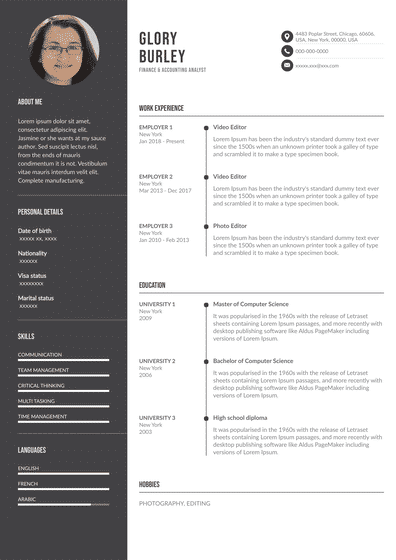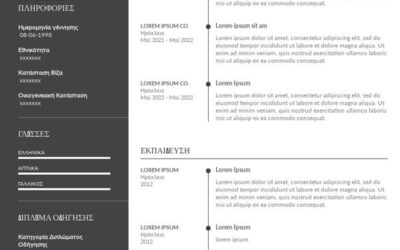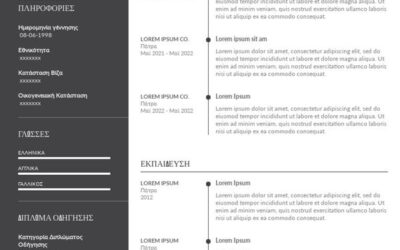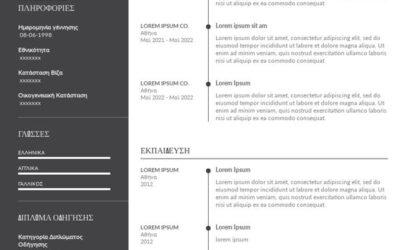Accountancy is one of the most popular degrees in the United States and for good reason. As the US economy grows, the employment rate of accountants and auditors is projected to increase by four percent from 2019 to 2029 .
Needless to say, competition can be tough even in entry-level roles but especially for higher-level managerial positions.
In order to stand out from others, it is not enough to mention your skills and experience.
Your Basic Guide to Writing an Accounting Resume
Your resume should effectively communicate why you are a good match for that specific role or function.
This guide includes accounting resume examples that can increase your chances of landing interviews.
Keep in mind that your accountant resume must be informative but still very easy to read.
As such, we will show you the best resume format to use in your applications. We will also teach you how to highlight relevant skills and experiences using the most appropriate keywords.
Let us discuss one by one the parts of the accounting resume that hiring managers will surely be looking for
Professional Summary Section
The professional summary section is the first thing that a hiring manager sees in your resume.
It is at the topmost part of an accountant resume because it serves to give a brief description of your experience, skills, and qualifications related to the open position.
This part needs to convince employers to go over your whole resume and consider your application.
Basically, you need to sell your business and financial knowledge in a short paragraph so that the hiring manager or employer would notice you faster.
So how do you write a professional summary?
- First, go to the job listing and carefully study the description.
- Find out what specific accounting tasks and functions will you be doing if you get that position. You also need to identify relevant skills and experiences that an ideal candidate should possess.
- Next, tailor-fit your previous experiences as an accountant to that job opening. Be specific with details and make sure to use important keywords from the job description.
- Do not forget to highlight relevant accounting certifications or awards to help increase your chances of getting picked.
- Finally, write a compelling statement about how you make an ideal candidate.
- Use action words to demonstrate your abilities. If possible, use numbers and data to prove your competency.
Remember to keep this part brief but informative. If you are applying as a senior accountant or any other managerial role, your tone should sound and reflect that you are reliable and confident.
Professional Summary Example
Licensed CPA and Senior Accountant at Y company with 10 years of experience. Led the implementation and development of a new accounting software that automated reports and saved 10 hours worth of weekly staff work. Worked closely with the budget department and developed a new accounts payable system that saved the company $25,000 in yearly expenses. Expert in preparing year-end financial statements and creating company budget plans.
Always start with the job title in your current role before highlighting your accomplishments.
If you have more questions, here is an in-depth guide on how to write a convincing professional summary.
Work Experience
Writing your work history in your accountant resume is very crucial.
You can expect hiring managers to scrutinize this section so you need to spend a lot of time making sure that all details are factual. After all, this will prove your qualifications as an accountant.
You need to follow a consistent format when writing details such as dates, company names, job titles, responsibilities, and achievements.
Some prefer to write the dates on the left beside the job title while others prefer to present the role first. It is up to you as long as the format is clear and uniform.
Make sure to write your roles in a reverse-chronological order, which means that the most recent work experience should be at the top.
Now if you have a very long list of job titles and positions, it would not make sense to include each one. You may choose to highlight three to five of your most recent accounting roles.
On the other hand, if you are a fresh graduate looking for an entry-level accounting job, the hiring manager would not expect a long list of work experience.
Instead, you may include summer internships, extra-curricular leadership activities in your university, and even projects you participated in your community.
Convince them that you are not only well-versed in basic accounting but also a dependable and reliable worker.
Here is an example of a well-written work experience section in an accounting resume.
Senior Accountant
ABC Company, New York, New York
March 2019 – Present
Key Roles and Responsibilities
-
Maintains the company’s financial ledger and does financial reporting to the CFO.
Performs account analysis and reconciles all accounting entries with bank statements and other transactions. Works closely with the audit team and helps resolve discrepancies in audit findings.
Heads payroll distribution. Implemented the payroll automation process, saving 10 hours worth of staff work every two weeks.
Oversees general accounting responsibilities of three junior staff accountants handling subsidiary team accounts.
Junior Accountant
ABC Company, Garden City, New York
July 2015 – February 2019
Key Roles and Responsibilities
-
Maintained the financial records by posting daily journal entries, including updating of accounts receivable and accounts payable.
Performed account reconciliation of balances with invoices and bank transactions
Saved $20,000 for the business by finding a reporting error.
Assisted the team in preparing payroll disbursements and reviewing expenses.
Submitted weekly and monthly financial reports in an accurate and timely manner.
If you can put numbers to backup your performance index in your previous roles, please do not hesitate to do so.
Education and Certifications
In the United States, you need to complete a Bachelor’s Degree in Accounting or Finance in order to land an entry-level staff accountant position.
However, getting licensed or certified in specific accounting fields can help you advance in your career.
How important is this?
Data shows that the average pay for a junior staff accountant position is $45,183 annually.
On the other hand, managerial positions that usually only accept those who have qualified for additional training and certification have a much higher average annual salary of $75,624 .
So how do you list your accounting education and certifications? In an accountant resume, it is better to start with your certifications.
Resume Example
Professional Certifications
CMA – Certified Management Accountant
September 2019
CPA – Certified Public Accountant
November 2015
Education
Bachelor of Science in Accounting
Leventhal School of Accounting, University of Southern California, Los Angeles, CA
Graduated 2015, Cum Laude
Professional Skills and Related Skills
The skills section should highlight your capabilities that are relevant to the job description.
For example, one of the most important accounting skills is attention to detail. It is also worth mentioning your communication skills.
However, you need to highlight specific operations and management skills in bullet points to help you stand out from others.
For example, you can specify which accounting software you have already mastered.
You also need to mention advanced skills like budget forecasting, profit and loss projections, and problem-solving abilities.
In this section, you need to realize the importance of using the right keywords to describe your skills.
You can watch this video to learn more about choosing the right keywords in resume writing.
Best Resume Format
Why is choosing a resume template important?
- Not only will it help you craft your resume easier, but following a format will also make your hiring managers notice your application.
- In the modern world, big companies now use an applicant tracking system (ATS) to filter the applications that they receive.
- In other words, you need to carefully select a resume format that can pass the standards of an ATS.
- After getting shortlisted by the company’s ATS, hiring managers will then proceed to check your account and profile.
- It is important to choose a clean template that will be easy on the eyes. You can see this in each accountant resume example.
In one of our blogs, we discussed different resume formats to help you identify which one suits your application better.
Best Accountant Resume Example (No Experience)
Are you worried about writing a resume when you don’t have any job experience yet?
You don’t have to!
Keep in mind that hiring managers do not expect fresh graduates to have a very long and extensive resume.
The important thing here is to highlight that you performed well as a student and that you display ideal skills and qualities that companies are looking for in an employee.
Note as well that you can easily make some changes in an accountant resume.
For example, instead of presenting a professional summary, you can opt to put a resume objective instead.
The latter tells the employer about your career goals as you enter the workplace.
Still, it is best to tailor your career objective to the requirements of the position you are applying for.
You need to identify your skills that can be of value to your employer and make sure to put them as part of your objective.
Finally, even without formal work history, you can write about your summer internship in one of the companies in your area.
You can also talk about your activities in school organizations. Highlight soft skills like your ability to lead and at the same time work as a team player, as well as your discipline, critical thinking, and assertiveness.
If you have no idea how to start or create a good accounting resume, you can use any resume example below as your guide in creating your first-ever accountant resume.
Example of a Career Objective in an Accountant Resume
Aiming to land an entry-level accounting role at ABC company to apply my knowledge as a Certified Public Accountant. Able to work long hours with strong analytical skills and high attention to detail. Proficient in MS Office particularly in Word, Excel, and PowerPoint.
Frequently Asked Questions
Here, we answer the most frequently asked questions of our readers and more writing tips..
What do you put on a resume for accounting?
The basic parts of an accounting resume include the following :
Header: This contains basic information such as your name, address, contact number, and email address.
Professional Summary: This is a short paragraph that describes your work experience, skills, and qualifications. Alternatively, fresh graduates can write a resume objective instead.
Work Experience: This is a detailed list of your most recent and most relevant job experiences.
Education and Certifications: A section that shows where you graduated from as well as the additional certifications you passed during the course of your career.
Skills: As an accountant, this is where you use bullet points to list down technical and soft skills that are relevant to the job you are applying for.
You also need to write a cover letter. Other sections like a career objective and references are just optional.
What is a good objective for an accounting resume?
A career objective in an accounting resume is only ideal for job applicants who are fresh graduates from the university or those who have none to very limited work experience.
A good career objective would specify how you can apply your accounting knowledge and relevant skills in your first job.
How do I write an accountant’s CV?
To write an accountant’s CV or resume, you can follow the information in this guide and make it your own.
To make things easier, you just need to choose one template from the accounting resume examples that we have prepared for you. Remember to quantify your resume when you can.
What are the basic accounting skills?
Basic accounting skills include the following:
-
Asset management
Preparation of general ledger
Preparation of revenue statements
Financial analysis and financial management
Attention to detail
Expert knowledge of filing tax returns
Analytical skills
Team Player
Good oral and written communication skills
Mastery of an accounting software
Tax preparation
Expertise in financial analysis
Get a Good Start with Our Resume Builder
Check our resume builder to ensure a good chance of passing the initial screening. We have resume templates to choose from. Make sure you also add a cover letter to go along with your resume.











